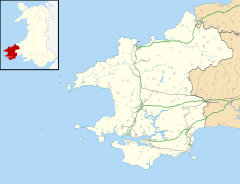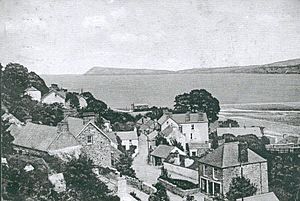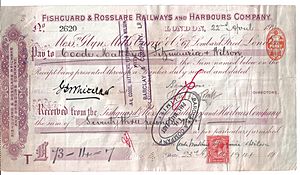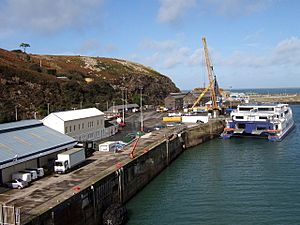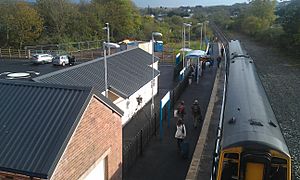Goodwick facts for kids
Quick facts for kids Goodwick
|
|
|---|---|
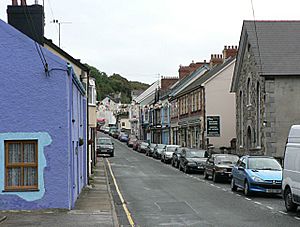 Main Street, Goodwick |
|
| Population | 1,988 |
| OS grid reference | SM945381 |
| Community |
|
| Principal area | |
| Ceremonial county | |
| Country | Wales |
| Sovereign state | United Kingdom |
| Post town | GOODWICK |
| Postcode district | SA64 |
| Dialling code | 01348 |
| Police | Dyfed-Powys |
| Fire | Mid and West Wales |
| Ambulance | Welsh |
| EU Parliament | Wales |
| UK Parliament |
|
| Welsh Assembly |
|
Goodwick (Welsh: Wdig) is a town located on the coast of Pembrokeshire, Wales. It sits right next to its twin town, Fishguard.
Together, Fishguard and Goodwick form a community that stretches around Fishguard Bay. This area includes not just the two towns, but also smaller places like Dyffryn and Harbour Village. In 2011, the population of Goodwick's local area was 1,988 people.
Contents
History of Goodwick
How Goodwick Got Its Name
Long ago, in the Viking Age (around the 900s), Vikings often raided the coasts of Wales. They also set up trading posts and settlements. The name "Goodwick" likely comes from two old Norse words: góðr (meaning 'good') and vik (meaning 'bay' or 'cove'). So, it means 'good bay'.
You can compare this to the name Reykjavík in Iceland, which means 'Smoking Bay'. Goodwick's hillside faces southeast, which protects it from strong, salty winds. This allowed many trees to grow naturally. Some older parts of Goodwick are even named 'Goedwig', which means 'forest' in Welsh. This makes some people think the name might have come from 'Goedwig' first.
From Village to Town
Goodwick used to be a small fishing village. But in 1887, work began on a railway line and a harbour. This caused the village to grow very quickly. Today, tourism is the main industry here. In the past, making bricks was also an important business. Some fishing still happens, but most of the bigger fishing activities are now based in Milford Haven.
Goodwick Sands is the local beach. This is where the French invasion force gathered before they surrendered on February 24, 1797.
Fishguard Harbour
The harbour was built by blasting away 1.6 million tonnes of rock from the hillside. This created a long breakwater (a wall built into the sea to protect the harbour). The area where the rock was removed became the quay, which is a platform where ships can load and unload.
The harbour officially opened on August 30, 1906. It was planned to be a major seaport for the Great Western Railway, replacing Neyland. However, there were problems that stopped very large ocean liners from docking. Because of this, a smaller inner breakwater was built to protect the harbour more.
The Great Western Railway ordered three new ships for its service to Rosslare: the St David, the St George, and the St Patrick.
The Mauretania Mole
In 1909, a famous ship called the RMS Mauretania visited. Its passengers had to use smaller boats called tenders to get to and from the train. The smaller breakwater was built especially for the Mauretania's visit. It is sometimes called the "Mauretania Mole". However, this breakwater caused sand and mud to build up, so future visits from large liners were stopped.
Above the harbour, there is a small area called "Harbour Village." It was built to house the workers who constructed the harbour.
Modern Harbour Use
Today, the port is used by Stena Line ferries that travel to Rosslare Europort in Ireland.
The RNLI (a charity that saves lives at sea) has a lifeboat station here. They operate an all-weather lifeboat, the Blue Peter VII, and a smaller inshore lifeboat from inside the harbour.
Marina Plans
In 2011, there were plans for a new Fishguard & Goodwick Marina. A company called Conygar wanted to invest £100 million in the project. They planned to build a marina with 450 places for boats, 253 new homes, and a large platform for the ferry port to expand. The plan also included a public walkway along the waterfront and visitor parking.
Most of these new buildings would have been built by adding land to the seabed within the two existing breakwaters. However, in 2018, Stena Line decided to pull out of the project. This meant Conygar could not continue with their plans.
Stop-and-Call
Stop-and-Call was once a separate small settlement. Now, it has grown and joined with Goodwick. It is located where Goodwick Hill becomes flat after climbing about 330 feet (100 meters) from the center of Goodwick.
In 1841, records show there were three houses in 'Stop and Call'. However, it did not appear on maps from around 1850. By 1888, maps showed 'Stop & Call' with only three main buildings.
Transport in Goodwick
Railway Station
The Fishguard & Goodwick railway station used to serve local train travelers. However, in 1964, the service was mostly stopped, with trains only running for ferry passengers. The station then fell into disrepair.
Thanks to new investments, the station was rebuilt and reopened for passengers on May 14, 2012. It now serves both the ferry trains and new local trains.
Ferry Services
The harbour is used by Stena Line ferries that travel to Rosslare Europort in Ireland. For example, in 2013, the ferry MS Stena Europe had two trips each way per day. One was around lunchtime, and the other was in the early morning. A faster ferry, the Stena Lynx III, used to operate only in the summer until 2011.
Bus Services
Goodwick has a local bus service that runs from Harbour Village or Stop-and-Call to Fishguard town hall. There are also two bus routes that pass through the town on their way between Fishguard and St Davids.
Early Aviation
Goodwick's Harbour Village was the starting point for the first successful flight from Britain to Ireland. This happened on April 22, 1912. A pilot named Denys Corbett Wilson flew a Bleriot XI plane. The flight lasted one hour and 40 minutes, and he landed near Enniscorthy, Ireland.
This amazing achievement was celebrated 100 years later in Fishguard and Goodwick in April 2012. A special play called '100 Minutes' was also performed to remember the event.
See also
 In Spanish: Goodwick para niños
In Spanish: Goodwick para niños
 | Mary Eliza Mahoney |
 | Susie King Taylor |
 | Ida Gray |
 | Eliza Ann Grier |


